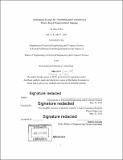| dc.contributor.advisor | Eric Klopfer. | en_US |
| dc.contributor.author | Wu, David,M. Eng.Massachusetts Institute of Technology. | en_US |
| dc.contributor.other | Massachusetts Institute of Technology. Department of Electrical Engineering and Computer Science. | en_US |
| dc.date.accessioned | 2019-11-12T18:13:09Z | |
| dc.date.available | 2019-11-12T18:13:09Z | |
| dc.date.copyright | 2018 | en_US |
| dc.date.issued | 2018 | en_US |
| dc.identifier.uri | https://hdl.handle.net/1721.1/122912 | |
| dc.description | This electronic version was submitted by the student author. The certified thesis is available in the Institute Archives and Special Collections. | en_US |
| dc.description | Thesis: M. Eng., Massachusetts Institute of Technology, Department of Electrical Engineering and Computer Science, 2018 | en_US |
| dc.description | Cataloged from student-submitted PDF version of thesis. | en_US |
| dc.description | Includes bibliographical references (page 62). | en_US |
| dc.description.abstract | StarLogo Nova is a tool that allows users to analyze complex systems by programming agent-based models with a block-based programming language. It can be used in education to study complex systems in a more modern way and is accessible to anyone who has access to the internet. However, there are still a few barriers that reduce StarLogo Nova's impact. First, it is only available in English, so users who are not fluent in English will have difficulty using the powerful tool. Second, novice users who are unfamiliar with programming may find it hard to learn how to program their models, which diminishes their ability to study the science concepts they are trying to model. This thesis takes steps to remedy these problems. First, I develop a system for translating StarLogo Nova into different languages. Then, I work with a fellow researcher in the Scheller Teacher Education Program (STEP) lab on the development of custom blocks: user-defined blocks that can be used to simplify the modeling process. Our design of custom blocks is made with the novice user in mind, creating a more intuitive custom-block creation experience than currently exists in other block-programming languages. | en_US |
| dc.description.statementofresponsibility | by David Wu. | en_US |
| dc.format.extent | 62 pages | en_US |
| dc.language.iso | eng | en_US |
| dc.publisher | Massachusetts Institute of Technology | en_US |
| dc.rights | MIT theses are protected by copyright. They may be viewed, downloaded, or printed from this source but further reproduction or distribution in any format is prohibited without written permission. | en_US |
| dc.rights.uri | http://dspace.mit.edu/handle/1721.1/7582 | en_US |
| dc.subject | Electrical Engineering and Computer Science. | en_US |
| dc.title | Abstraction systems for translating and customizing a blocks-based programming language | en_US |
| dc.type | Thesis | en_US |
| dc.description.degree | M. Eng. | en_US |
| dc.contributor.department | Massachusetts Institute of Technology. Department of Electrical Engineering and Computer Science | en_US |
| dc.identifier.oclc | 1126543535 | en_US |
| dc.description.collection | M.Eng. Massachusetts Institute of Technology, Department of Electrical Engineering and Computer Science | en_US |
| dspace.imported | 2019-11-12T18:13:08Z | en_US |
| mit.thesis.degree | Master | en_US |
| mit.thesis.department | EECS | en_US |
